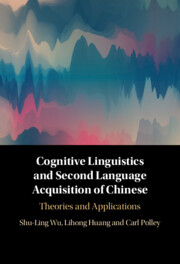Book contents
- Cognitive Linguistics and Second Language Acquisition of Chinese
- Cognitive Linguistics and Second Language Acquisition of Chinese
- Copyright page
- Contents
- Figures
- Tables
- Abbreviations
- Preface
- 1 Cognitive Linguistics and Second Language Acquisition
- 2 Construal in Language
- 3 Concepts and Categorization
- 4 Iconicity and Image Schemas
- 5 Metaphor and Metonymy
- 6 Polysemy
- 7 Embodied Cognition and Mental Simulation
- 8 Teaching Chinese Modal Verbs
- 9 The Future of Cognitive Linguistics in Chinese Studies
- References
- Index
3 - Concepts and Categorization
Published online by Cambridge University Press: 01 February 2024
- Cognitive Linguistics and Second Language Acquisition of Chinese
- Cognitive Linguistics and Second Language Acquisition of Chinese
- Copyright page
- Contents
- Figures
- Tables
- Abbreviations
- Preface
- 1 Cognitive Linguistics and Second Language Acquisition
- 2 Construal in Language
- 3 Concepts and Categorization
- 4 Iconicity and Image Schemas
- 5 Metaphor and Metonymy
- 6 Polysemy
- 7 Embodied Cognition and Mental Simulation
- 8 Teaching Chinese Modal Verbs
- 9 The Future of Cognitive Linguistics in Chinese Studies
- References
- Index
Summary
Chapter 3 introduces another cognitive mechanism called categorization. Categorization is an automatic and unconscious cognitive process that enables our limited cognitive capacities to understand and organize information, make predictions, and respond to new situations. Notable crosslinguistic variation can be found in conceptual categories. Such variation can be manifested in morphemes, words, grammar, phonology, and other levels of linguistic structure. The theory of linguistic relativism suggests that linguistic categories may implicitly affect how we categorize objects and events. Consequently, learning L2-specific categories generally entails a certain degree of conceptual recategorization.
Keywords
- Type
- Chapter
- Information
- Cognitive Linguistics and Second Language Acquisition of ChineseTheories and Applications, pp. 40 - 65Publisher: Cambridge University PressPrint publication year: 2024

